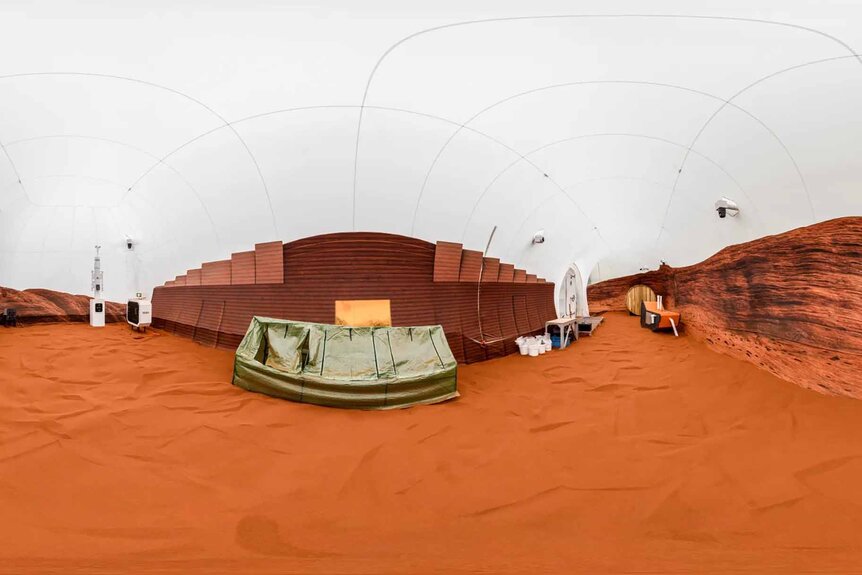Create a free profile to get unlimited access to exclusive videos, sweepstakes, and more!
NASA Seeking Applicants for Next CHAPEA Simulated Mars Mission
For the aspiring astronaut who doesn't want to leave the planet.
We’re still in the infancy of crewed space exploration. We’ve sent a dozen people to the Moon, and we’ve continuously inhabited a space station in low-Earth orbit for more than two decades. Those aren’t small achievements, but when it comes to exploring the solar system – let alone exploring other star systems, like in SYFY’s The Ark – we’ve barely stepped out our front door.
NASA’s Artemis program aims to return humans to the Moon’s orbit on its upcoming Artemis II mission, and put boots on the ground for the first time in more than 50 years on Artemis III. This time, the goal is to establish a permanent presence on the lunar surface which could serve as a jumping off point for crewed missions to Mars. There’s no telling at this point when a crewed mission to the Red Planet might take place, but NASA is already preparing for the eventuality.
Apply to Join NASA’s Upcoming Simulated CHAPEA Mars Mission
The administration is currently seeking applications for a year-long simulated Mars mission right here on Earth. It’s part of NASA’s Crew Health and Performance Exploration Analog (CHAPEA, for short) program. CHAPEA missions are designed to be as close an experience to living on Mars as possible in the hopes of finding failure points. The idea is to put a group of people into a closed environment for a year-long stretch and just see what happens. If we identify problems during the dress rehearsals on Earth, we can correct or plan for them before we go for the real thing.
For More on Mars:
NASA's Perseverance Spies Damaged Ingenuity Helicopter on Mars
Could You Really Fake a Mars Landing? The Science of Capricorn One
What Is the Perfect Number of People for a Mars Colony?
The first CHAPEA mission began on June 25, 2023 and is ongoing. The crew of Mission 1 will walk out the habitat door and return to Earth in June 2024. In the meantime, NASA is looking for the crew of CHAPEA Mission 2, which is planned to begin in 2025. A four person crew will live inside the Mars Dune Alpha habitat at NASA’s Johnson Space Center in Houston. Mars Dune Alpha is a 1,700 square foot 3D-printed facility designed to replicate the sorts of habitats we might construct and use on the Red Planet.
Once inside, the crew will be cut off from the rest of the world and live under simulated Martian pressures. They’ll need to carry out simulated spacewalks, work with robots, maintain their habitat and equipment, exercise, grow crops, and more. And they’ll have to do all that while managing limited resources, communications delays – the light-speed delay between Earth and Mars is between 3 and 22 minutes each way, depending on where the planets are in their orbits – and cramped quarters.
If you want to apply, you must be a U.S. citizen or permanent resident between the ages of 30 and 55, an English speaker, healthy, motivated, and a non-smoker. Applications for Mission 2 opened February 16 and will close on April 2, 2025 at 5:00 PM Central time. Ideal candidates should have a master’s degree in a STEM field and at least two years of professional STEM experience or 1,000 hours of piloting an aircraft. Candidates with a bachelor’s degree and four years of professional STEM experience or the completion of a test pilot program will also be considered. Compensation for participating in the mission is available but unlisted. The crew of Mission 1 are reportedly receiving about $160 a day, roughly $60,000 for the entire year. It’s likely that compensation for Mission 2 will be comparable.
If you’ve ever wanted to help push the boundaries of human space exploration but you’re afraid to strap yourself to a rocket, this is your chance to etch your name into the annals of astronaut history without ever leaving home.
Because when things go wrong far from home, they really go wrong. The Ark is returning for Season 2 this summer!



































